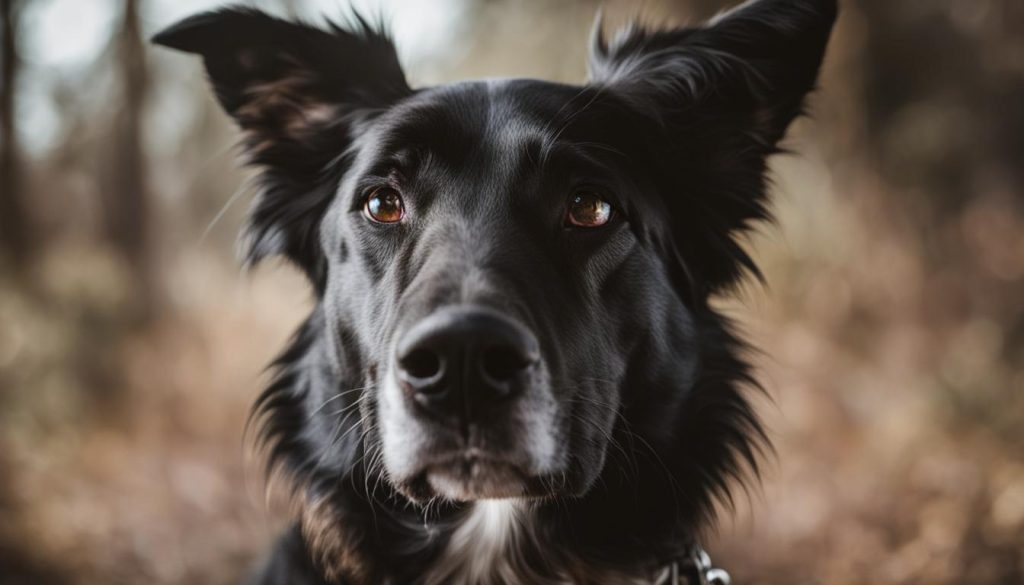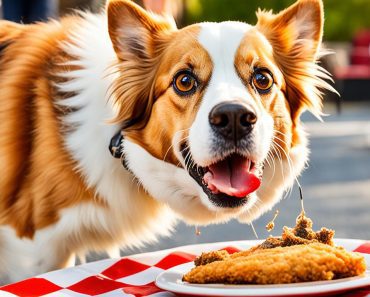As a dog owner, it’s crucial to be aware of the early warning signs of canine cancer. Dogs over the age of 10 have a 50% chance of developing this devastating disease, so recognizing the symptoms can make a significant difference in their prognosis.
Here are 10 key dog cancer signs to watch for:
- Lumps and Bumps on the Skin: Gently check your dog’s body for any unusual growths.
- Abnormal Odors from the Mouth or Ears: Pay attention if you notice any persistent strange smells coming from your dog’s oral or ear areas.
- Non-Healing Wounds or Sores: Keep an eye on any persistent wounds or sores that don’t seem to be healing.
- Loss of Appetite or Weight Loss: Notice if your dog is experiencing a sudden decrease in appetite or significant weight loss.
- Coughing or Difficulty Breathing: Watch for persistent coughing or signs of respiratory distress.
- Increased Drinking or Urinating: Monitor any sudden changes in your dog’s water intake or urination frequency.
- Difficulty Swallowing: Be mindful of any trouble your dog may have while swallowing food or water.
- Changes in Bathroom Habits: Take note of any alterations in your dog’s bowel movements or urination patterns.
- Evidence of Pain: Look for signs of discomfort or ongoing pain in your dog’s behavior and body language.
- Lower Energy Levels: Keep track of any significant decrease in your dog’s overall energy and activity levels.
Remember, these signs may indicate the presence of cancer, but they can also be symptoms of other health issues. If you observe any of these warning signs in your furry friend, it’s essential to consult with a veterinarian for a proper diagnosis and timely treatment.
Key Takeaways:
- Dogs over the age of 10 have a higher likelihood of developing cancer.
- Signs of dog cancer include lumps and bumps on the skin, abnormal odors from the mouth or ears, non-healing wounds or sores, loss of appetite or weight loss, coughing or difficulty breathing, increased drinking or urinating, difficulty swallowing, changes in bathroom habits, evidence of pain, and lower energy levels.
- If you notice any of these signs, consult a veterinarian for further investigation.
Lumps and Bumps on the Skin
One of the key signs of cancer in dogs is the presence of lumps and bumps on the skin. These can be felt when gently running your hands over your dog’s body. It’s important to note that the presence of a lump does not necessarily mean it is cancerous, but it should be tested by a vet to be sure. Lumps can form on any part of the body, including between the toes, so it’s important to check your dog’s feet as well.
When examining your dog for lumps and bumps, pay attention to any changes in size, shape, or texture. Hard or firm lumps, irregular shapes, or lumps that are growing rapidly should be evaluated by a veterinarian. It’s better to be safe and have it checked out, rather than waiting and potentially missing an opportunity for early detection and treatment.
While not all lumps and bumps are cancerous, they can still be an indicator of other health concerns. Some common non-cancerous causes of lumps and bumps include cysts, lipomas (fatty tumors), and abscesses. Only a vet can accurately diagnose the cause of a lump, so it’s important to seek professional advice.
In addition to feeling for lumps and bumps on your dog’s skin, regularly check for any changes in your dog’s coat, such as patches of hair loss or discoloration. These could also be signs of underlying health issues, including skin cancer.
If you notice any lumps, bumps, or other concerning changes on your dog’s skin, make an appointment with your vet as soon as possible. Early detection and treatment can greatly improve the outcomes for your furry friend.
Abnormal Odors from the Mouth or Ears
Unusual smells coming from your dog’s mouth or ears can be warning signs of cancer. These odors may be caused by various factors, including dental issues, ear infections, or tumors in the mouth.
If you notice a persistent odor emanating from your dog’s mouth or ears, it is crucial to have them examined by a veterinarian. Identifying the underlying cause of the odor is essential in determining whether it could be indicative of cancer or another health concern.
This image illustrates a dog’s mouth and ears, providing a visual representation of the areas to monitor for abnormal odors:
Regularly checking your dog for any unusual smells from the mouth or ears can help detect potential health issues early on. If you observe persistent and concerning odors, do not hesitate to seek professional veterinary advice to ensure your dog’s well-being.
Non-Healing Wounds or Sores
Persistent wounds or sores that do not heal can be a sign that something is not right with your dog’s immune system. They could also indicate the presence of cancer, so it’s important to have them checked by a vet. Non-healing sores can be a sign of infection or other underlying health issues.
If your dog has a wound or sore that doesn’t seem to be getting better, it could be a cause for concern. While some minor wounds may take a little longer to heal, if you notice that a wound or sore is not improving or seems to be getting worse over time, it’s crucial to seek veterinary attention.
When a wound or sore does not heal, it may indicate a problem with your dog’s immune system. The immune system plays a vital role in fighting off infections and promoting healing. If the immune system is compromised, either due to an underlying condition or cancer, the body’s ability to heal wounds can be affected.
Possible Causes of Non-Healing Wounds
There are various reasons why a wound or sore may not heal properly. Infections, such as bacterial or fungal infections, can prevent proper healing and lead to chronic wounds. Other underlying health issues, such as diabetes or autoimmune diseases, can also interfere with the healing process.
- Infections: Wounds that become infected can develop into non-healing sores. Bacteria or fungi can colonize the wound, impeding the healing process. Your vet may need to prescribe antibiotics or other medications to address the infection.
- Poor Blood Circulation: Adequate blood flow is essential for delivering nutrients and oxygen to the wounded area. If your dog has poor circulation, perhaps due to cardiovascular disease, it can hinder the healing process. Your vet can provide guidance on managing circulatory issues.
- Cancerous Sores: Non-healing wounds can sometimes be an indication of cancerous growth. Cancerous sores may bleed, appear discolored, or have irregular borders. If you suspect cancer, it’s crucial to have your dog evaluated by a veterinarian for proper diagnosis and treatment options.
Remember, non-healing wounds or sores in dogs should never be ignored. It’s important to consult with your vet to determine the underlying cause and develop an appropriate treatment plan. Early intervention can improve your dog’s prognosis and overall well-being.
Loss of Appetite or Weight Loss
A loss of appetite or rapid weight loss in your dog can be concerning. While it may be related to dental issues or other medical conditions, it is also important to consider the possibility of something more serious, such as cancer. Changes in your dog’s eating habits or unexplained weight loss should not be ignored and warrant a consultation with a veterinarian.
Cancer can affect a dog’s appetite and metabolism, leading to a decrease in food intake and subsequent weight loss. The underlying mechanisms for this are complex and can vary depending on the type and stage of cancer. In some cases, the tumor itself may directly affect the digestive system or interfere with the dog’s ability to absorb nutrients. Additionally, the body’s response to cancer, such as inflammation or changes in hormone levels, can contribute to a loss of appetite and weight loss.
To determine the cause of your dog’s loss of appetite or rapid weight loss, a veterinarian will perform a thorough examination, which may include blood tests, imaging studies, and possibly a biopsy. It is important to remember that not all cases of weight loss in dogs are due to cancer, as there are various other factors that can contribute to these symptoms. However, it is always better to be safe and seek professional veterinary advice to rule out any serious underlying conditions.
Possible causes of loss of appetite and weight loss in dogs:
- Cancer
- Dental issues
- Gastrointestinal disorders
- Infections
- Organ dysfunction
- Stress or anxiety
If you notice that your dog is not eating or experiencing rapid weight loss, it is crucial to provide them with the proper medical attention. Early detection and treatment can significantly improve the prognosis for dogs with cancer or other serious health conditions.
Coughing or Difficulty Breathing
If you notice that your dog has been experiencing a persistent cough or is having difficulty breathing, it is crucial to pay attention to these symptoms as they could be indicators of more serious health issues, including cancer. While humans commonly experience coughs and colds, dogs do not typically exhibit these symptoms unless there is an underlying problem. Therefore, it is important not to dismiss a persistent cough or difficulty breathing in your dog.
These signs can potentially point to cancer in your dog’s respiratory system. Cancerous growths in the lungs or other parts of the respiratory system can lead to coughing or labored breathing. It is essential to have your dog evaluated by a veterinarian if you observe these symptoms to determine the cause and provide appropriate treatment.
A veterinarian will conduct a thorough examination and may recommend additional diagnostic tests, such as X-rays or bloodwork, to rule out or confirm the presence of cancer in your dog’s respiratory system. Early detection and intervention are crucial in addressing any potential health concerns and improving your dog’s overall well-being.

Remember, it is always better to err on the side of caution when it comes to your furry companion’s health. If you notice any changes in your dog’s breathing patterns or a persistent cough, seek veterinary care promptly. By taking quick action, you can provide your dog with the best chance of managing any underlying respiratory conditions and ensure their continued comfort and happiness.
Increased Drinking or Urinating
If you notice that your dog is suddenly drinking more water than usual or needing to go outside to urinate more frequently, it could be a sign of an underlying health issue. Excessive drinking, also known as polydipsia, and frequent urination, also known as polyuria, are symptoms that should not be ignored.
These symptoms can be indications of various health conditions, including certain types of cancer in dogs. Lymphoma, for example, can cause increased thirst and urination as it affects the lymphatic system. Additionally, metabolic illnesses like diabetes or kidney disease can also lead to excessive drinking and urinating.
It is important to have your dog checked by a veterinarian if you observe these changes in their drinking and urination habits. A thorough examination and appropriate diagnostic tests can help determine the underlying cause. Remember, early detection and intervention are crucial in managing health conditions effectively and ensuring the well-being of your beloved pet.
FAQ
What are the signs of dog cancer?
Some common signs of dog cancer include lumps and bumps on the skin, abnormal odors from the mouth or ears, non-healing wounds or sores, loss of appetite or weight loss, coughing or difficulty breathing, increased drinking or urinating, difficulty swallowing, changes in bathroom habits, evidence of pain, and lower energy levels.
How can I tell if my dog has lumps or bumps on the skin?
You can feel for lumps or bumps on your dog’s skin by gently running your hands over their body. It’s important to note that the presence of a lump does not necessarily mean it is cancerous, but it should be tested by a vet to be sure.
What do abnormal odors from the mouth or ears indicate?
Abnormal odors from your dog’s mouth or ears can be a warning sign of cancer. This could be due to dental issues, ear infections, or tumors in the mouth. If you notice a persistent odor, it’s important to have your dog examined by a vet to determine the cause.
What should I do if my dog has non-healing wounds or sores?
Non-healing wounds or sores can be a sign of cancer or other underlying health issues. It’s important to have them checked by a vet to determine the cause and receive appropriate treatment.
Why is my dog losing appetite or weight?
A loss of appetite or rapid weight loss in your dog can be a sign of various health issues, including cancer. If your dog is not eating or losing weight without a clear explanation, it’s important to consult with a vet to identify the cause and determine the best course of action.
What does it mean if my dog is coughing or having difficulty breathing?
If your dog is experiencing persistent coughing or difficulty breathing, it could be a sign of more serious health issues, including cancer. These symptoms should be taken seriously, and it’s important to have your dog evaluated by a vet.
Why is my dog drinking and urinating more than usual?
Increased drinking or urinating can be a warning sign of certain types of cancer in dogs, as well as other metabolic illnesses. If your dog suddenly starts drinking more water or going outside to urinate more frequently, it’s important to have them checked by a vet to rule out any underlying health issues.






